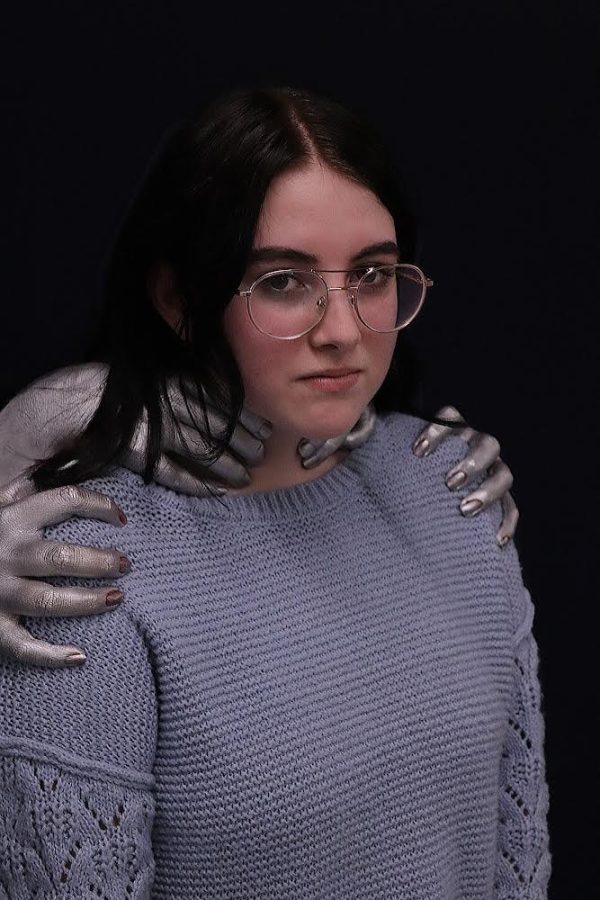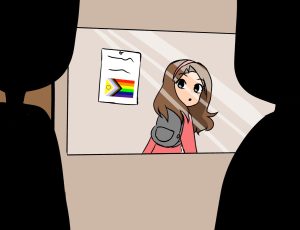Hidden Monster Within
Teen girl speaks about mental health struggles
Students suffering with mental health issues compare mental illness to the feeling of being strangled or suffocated.
January 27, 2022
There is a monster inside her; inside her head and her body. The monster consumes and destroys her. As she lies there, unable to move, she feels she is being smothered. Hands are completely encasing her throat, choking her. She feels claws ripping through her chest and shredding her insides. No matter how many times she tries to take a breath, she can’t. Her limbs don’t want to move—she doesn’t want to move. The claws won’t stop, and there is no air. She can’t do this, not today.
She goes to the supermarket with her mom and sister, a typical thing to do. While her family goes to the store, she decides to wait in the car. She is just scrolling through social media when all of a sudden a sketchy looking person walks into the store. She tries to ignore the person, but she can’t. A little “monster” over her shoulder tells her over and over: ‘That man that walked into the store just now? He’s going to kill your mom with no remorse, no questions asked.’ She rushes out of the car and into the store, she searches every aisle for her beloved family. Finally, after looking for what felt like hours, she sees her sister and mom looking at the chips. A sense of relief washes over her as she spots them. They are safe, they are fine… for now.
She walks into school, hoping the day will go without a hitch. All is fine, until she gets to her history class. They are going to play a review game. Not a big deal to some, but to her it is. Everyone will be looking at her, watching her, and judging her. This makes her anxious, she can’t do this, she can’t go up there. Why couldn’t the teacher just give them a packet of paper to review? For heaven’s sake this is high school, not the second grade. The game begins and she can’t breathe. Her face may not show it, but her insides are churning with fear. After moments of suffering in silence, it’s her turn to go up to the board. She slowly approaches and stares at the question and the answer choices. All she has to do is click an answer and sit back down. That’s simple, right? Wrong. The “monster” is going into overdrive. ‘The answer doesn’t matter, everyone is looking at how fat you are. They are looking at your bad posture and your ugly clothes. You are pathetic. You mean nothing. It would be doing a favor to everyone if you just disappeared. Why, why, why… Finally, on the verge of tears, she clicks her answer choice. She doesn’t even look if it’s right or wrong, she just returns to her seat. None of this matters, her life doesn’t matter.
She sits in her room as a sense of euphoria washes over her. If she does this one thing, she won’t have to wrestle with this devastating monster any longer. She won’t have to be tortured by this disgusting thing that lives within her constantly. She’ll just leave and never come back. If she leaves this world entirely, then she won’t feel this way any longer. She will finally be free and she just won’t be alive anymore. But… What about her mom? What about her sister? What about her best friend? What would they say? What would they do if she wasn’t around anymore? They would probably be hurt. And broken. She can’t do that to them. That’s not fair to them. She can’t leave them, not right now. A huge surge of regret and dread comes over her. She guesses she could hold on for a little longer. Just for them. She lies down in her bed, under her covers, and tries to sleep and ignore the terrible, terrible “monster” that continues to ruin her life.
“I’m so emotionally fragile that I would rather be dead than have to deal with any of that,” Lucy said.
Senior Lucy Miller has been battling her mental health from an early age. Since the young age of seven. She is now 18 years old. 16.5% or one in six of U.S. youth aged 6-17 experienced a mental health disorder in 2016; that is 7.7 million people. Lucy is a part of this statistic along with so many others. Most of the time, people struggle silently and don’t get the opportunity to speak out like Lucy gets the chance to. Lucy said that she struggles with severe depression, severe social anxiety, self esteem issues, paranoia, and suicidal thoughts.
Lucy said that her mental health and her struggles today stems from her childhood and when she was growing up.
“It was simply because the household that I was in never really respected my boundaries and my family wasn’t really emotionally available,” Lucy said. “So that was a huge part of me being just ‘Oh I’ll get out of their way.’”
From that young age, Lucy couldn’t quite grasp why she was feeling so sad and why she wanted to not be alive anymore. Ironically Lucy said that she hasn’t been depressed since she was seven, the sadness wasn’t as repetitive as depression. She said that she didn’t even have the mental structure to be depressed.
“I feel like in the situation that I grew up in, I had every right to be as sad as I did,” Lucy said. “I had every right to cry myself to sleep every night because of my whole life. So I feel like that was just a response to the situation I was in.”
Lucy has been depressed since the 7th grade. Since then she has been trying to find treatment that isn’t therapy, as she can not afford it. Instead she tries to help herself by doing things that make her feel good.
“Therapy is expensive and I can’t do it,” Lucy said. “I’m trying to self-soothe. It’s really about just doing very small things that make me happy.”
Some of her self soothing methods are drinking a certain drink or wearing her favorite color that day. She does this so she can try to help herself and improve her mood for that day.
“I love coffee, I like drinking coffee,” Lucy said. “I love listening to music. I do that and it makes me happy. I like talking about certain things that make me happy. I like the color yellow so I try to incorporate the color into my outfit. I will try to do something to make myself happy just so I can get through that day.”
Unfortunately, even Lucy has days when the “monster” grips her and not even the color yellow can save her from the talons. There are some days when she can’t even get herself to take a step. She said that her depression makes it feel like a really heavy weight on her chest among other things.
“You physically feel like you are being smothered,” Lucy said. “You feel like you have a really big congestion in your chest and your throat. You feel like your chest is about to explode and your heart is beating really really fast. In that moment because of the way you feel, your body’s reaction to that tightening and that awful feeling you’re just like ‘I can’t deal with this, I don’t want to feel this uncomfortable’ It’s not painful, it’s just the most uncomfortable feeling in the world. And you have to feel like that for days on end. It gets to the point where you are like ‘I don’t want to be here anymore.’”
Lucy believes that there are many misconceptions going around about depression and mental health in general. She said that being depressed is not about being unhappy.
“Being depressed is not about crying,” Lucy said. “It’s not about being sad. It’s about feeling like the most disgusting hollow empty shell of a person who deserves to be beaten and dragged through the yard for existing.”
Lucy wants people to understand that all mental ailments are a disease in your body and in your brain and it should be treated and validated just like all the other illnesses people can suffer from.
“I just wish that people would treat it as a medical issue,” Lucy said. “We need to treat people with mental illnesses like what they are, which is a diseased person. They have a disease which needs treatment. Depression is terminal in every sense unless you get treatment.”
The systems we have in place at school to catch, prevent, and treat mental illnesses and health are not effective like they should be. Lucy said that the systems need to be changed if they want to be truly efficient.
“The systems we have in place say that you as a student should only care about two things. 1. making your parents proud and going into college and 2. caring about getting good grades and not being a bad student,” Lucy said. “It seems like as long as your education is doing well, they don’t care about you. The systems definitely need to change where they see [your mental health] as a medical issue. There needs to be more accommodations. I don’t think that people with mental illnesses, if they don’t want to, shouldn’t have to participate in things like pep rallies or anything like that that could trigger them and there shouldn’t need to be an explanation.”
Lucy describes what she doesn’t want when people find out she is depressed. That is being dragged into the counselors center and being questioned like a crook and being forced to open up.
“As a depressed person, this [scenario] is not what I want,” Lucy said. “If I were to tell someone that I was depressed and they told a teacher because they are concerned for me, if that teacher were to go to the counselor and then take me out of classes into the office and the counselor were to ask me ‘Oh well how do you feel?’ That’s an immediate suicidal thought, thats an immditate ‘I don’t want to deal with this, I don’t want to talk about my feelings.’ I don’t know how to explain to someone that I don’t want to exist anymore. That’s an extremely hard thing to explain.”
Lucy wants people to understand that people’s mental health challenges are not a picnic or a walk around the park.
“People act like it’s a game and they act like it’s cute, that you can self diagnose yourself,” Lucy said. “I don’t want to doubt anyone’s mental health because I know how hard it is to get someone to believe you.”
Many people think that people don’t want to be set apart or be treated differently for their struggles. While that may be true for some, that is not the case with Lucy. Lucy wants to be prioritized and helped.
“I want to be set apart because I want my needs met when it comes to my mental illness,” Lucy said. “I am doing it for attention. The number one thing is that people will say ‘Oh she’s doing it for attention.’ Yes, because I’m screaming for help.”
Lucy wanted to open up and share about her endeavor because she never gets the opportunity to. It is a challenge for her to define and describe her battle and when people sit and humor about it, it enrages her.
“I feel like I never get to talk about it,” Lucy said, “I feel like people never really hear me. If I could explain a horrible gruesome murder scene where someone ripped another person’s throat out and just tortured them, and if I tried to get someone to understand how severe it was, that’s how I feel about when I try to explain my mental illness. I have gone through the most excruciating mental and physical pain. To see other people making jokes about it or invalidating me makes me feel furious.”
It is important for us to understand that we don’t always know what is going on with the person sitting right next to us. Whether that person is a complete stranger in front of you in the line at the store checkout or your best friend of 6 years. Making jokes or laughing about mental illness can really affect a person whether they show it outworldly or not. We should treat people who are battling these mental demons with respect and care because you don’t know if what you say or do could disturb them in a mental way. Lucy tries her best everyday to fight this unseen attack on her mind. She hasn’t given in yet and she is aspiring not to. If she gives in she won’t see her family, friends, or be able to eat her favorite foods anymore.
“Cinnamon raisin bagels are the best bagels,” Lucy said. “They are one of the most important things to me.”
While Lucy has been able to speak out about her “monster”, there are unfortunately monsters living inside of all of us. Some are small and some are gigantic. If you or a loved one are struggling with containing, controlling, and withstanding this “monster”, don’t be afraid to ask for help and to try your best to seek treatment. Inside everyone is not just a “monster”, but the power to defeat it.
“Depression is terminal,” Lucy said. “I just have to fight it as hard as I can and never give up.”
(Names have been changed to protect the innocent.)
This is one of two articles in the in-depth news/feature series. Read the next article at called Mental Health declines during Coronavirus Pandemic https://shsthechampionsjournal.net/6641/features/mental-health-decline-during-covid/







